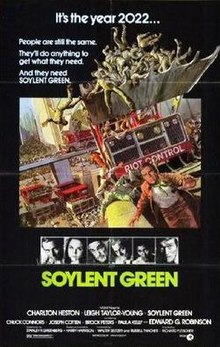Soylent Green
| Soylent Green | |
|---|---|

Theatrical release poster by John Solie
|
|
| Directed by | Richard Fleischer |
| Produced by |
Walter Seltzer Russell Thacher |
| Screenplay by | Stanley R. Greenberg |
| Based on |
Make Room! Make Room! 1966 novel by Harry Harrison |
| Starring |
Charlton Heston Leigh Taylor-Young Edward G. Robinson |
| Music by | Fred Myrow |
| Cinematography | Richard H. Kline |
| Edited by | Samuel E. Beetley |
| Distributed by | Metro-Goldwyn-Mayer |
|
Release date
|
|
|
Running time
|
97 minutes |
| Country | United States |
| Language | English |
| Box office | $3,600,000 (rentals) |
Soylent Green is a 1973 American science fiction thriller film directed by Richard Fleischer and starring Charlton Heston, Leigh Taylor-Young, and, in his final film, Edward G. Robinson. The film combines the police procedural and science fiction genres, depicting the investigation into the murder of a wealthy businessman in a dystopian future suffering from pollution, overpopulation, depleted resources, poverty, dying oceans, and year-round humidity due to the greenhouse effect. Much of the population survives on processed food rations, including "soylent green".
The film, which is based upon the 1966 science fiction novel Make Room! Make Room! by Harry Harrison, won the Nebula Award for Best Dramatic Presentation and the Saturn Award for Best Science Fiction Film in 1973.
The 20th century's industrialization leaves the world overcrowded, polluted and suffering global warming due to "the greenhouse effect". In 2022, with 40 million people in New York City, housing is dilapidated; homeless people fill the streets; many are unemployed, the few "lucky" ones with jobs are only barely scraping by, and food and working technology is scarce. Most of the population survives on rations produced by the Soylent Corporation, whose newest product is Soylent Green, a green wafer advertised to contain "high-energy plankton" from the World Ocean, more nutritious and palatable than its predecessors "Red" and "Yellow", but in short supply.
...
Wikipedia
